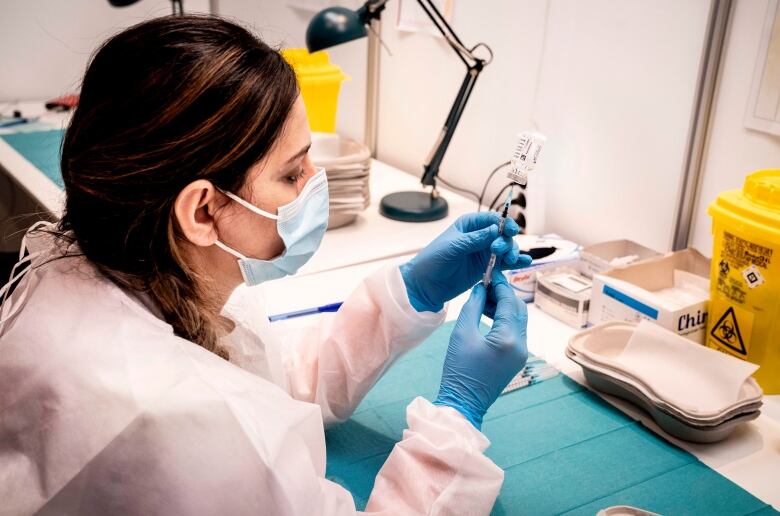AstraZeneca-Oxford's COVID-19 vaccine safety questions answered
Clotting condition linked to the vaccine explained

We're answering your questions about the pandemic. Send yours toCOVID@cbc.ca, and we'll answer as many as we can. We publish a selection of answers online and also put some questions to the experts during The National and on CBC News Network. So far, we've received more than 72,000 emails from all corners of the country.
The recommendation to pause AstraZeneca-Oxford COVID-19 vaccinations among Canadians under age 55 over concerns the vaccine is linked to a rare blood clotting condition has promptedquestions.Here are some answers.
Health Canada is requiring AstraZeneca and Verity Pharmaceuticals/Serum Institute of India, maker oftheCovishieldversion of the vaccine, to take a detailed look at the benefits and risks of their vaccinesby age and sex as part of the regulator's evaluation of rare blood clotting events following vaccination.
Dr. Theresa Tam, Canada's chief public health officer, said on Tuesdaythat all chief medical officers of health across the country agreed to the pause as a precaution.
"While the data is being gathered, we amassed experts from Canada but also had experts from Germany providing[their] first-hand interpretation of what this clotting with low platelets entity is like and some of the underlying scientific explanations," Tam said.
"Canadians should be reassured that we have systems in place to detect safety signals and then analyze them."
WATCH |AstraZeneca guidance change 'precautionary,' says federal government adviser:
The National Advisory Committee on Immunization (NACI) recommended that provinces not use AstraZeneca's COVID-19 vaccine in the younger age group while clotting concernsareinvestigated.
The shift follows Health Canada's call to update the label for the products following reports of rare adverse events in Europe of thrombosis (blood clots) with thrombocytopenia a low count of blood platelets that help with clotting.
Investigators in Europe, where the vaccine has been used for a longer period of time and in more people than in Canada, are looking for answers.
WATCH | Why regulators place holds when investigating safety concerns:
NACI still recommends the AstraZeneca vaccine among those over the age of 55 with informed consent, given this population'slow risk of developing ofthrombocytopeniabuthigher risk of hospitalization and death from COVID-19.
What's the clotting condition?
German researchers have named the condition VIPIT, which stands for Vaccine-Induced Prothrombotic Immune Thrombocytopenia.
According to NACI, VIPIT is associated with the development of antibodies that "activate" platelets.
Platelets are tiny fragments of blood that help the body form clots to stop bleeding.

VIPIT is different from the blood's regular clotting mechanism and conditions like deep vein thrombosis.
Is it treatable?
Yes.
NACI said about 40 per cent of VIPIT cases are fatal but thatthe conditioncouldimprove with better awareness and early treatment.
What happens in VIPIT?
Dr. Theodore (Ted) Warkentin, a hematologist and professor of pathology and molecular medicine at McMaster University, is studying what could be behind the adverse event.
Warkentin saidthe adverse reactions to the vaccine appeared to have similarities toa well-known condition called heparin-inducedthrombocytopenia (HIT), where the blood thinner heparin paradoxically triggers the formation of an antibody that directly activates platelets.
When platelets are activated, they morph from round to spiny in shape to stimulate blood clots.
Heparin binds to a protein that forms a complex. But some people produce antibodies against the complex, leading to a clotting reaction that's haywire. No one knows why it happens.
Warkentin and his German collaborators are experts in non-heparin triggers of the reaction. They consider the vaccine adverse events to be an HIT-mimicking disorder.

"Rarely, you can get a reaction where a disorder looks just like HIT that does not have a heparin trigger," Warkentin said. "In some cases, it might be a preceding infection, like a viral infection. In others, bizarrely, knee replacement surgery can trigger a HIT reaction. This isn't widely known even by physicians because it's very rare."
Medical researchers drew on 30 years of experience with HIT as a model to be able get to this point in investigating the adverse clotting events following vaccination.
What should people watch out for?
Dr. Bonnie Henry, British Columbia's provincial health officer, said anyone who received a shot of the AstraZenecavaccine more than 20 days ago doesn't need to be on the look out for VIPIT.
People should watch for these symptoms between four to 20 days after vaccination and seek immediate medical attention if they occur:
-
Shortness of breath
-
Chest pain
-
Leg swelling
-
Persistent abdominal pain
-
Sudden onset of severe or persistent worsening headaches or blurred vision
-
Skin bruising (other than at the site of vaccination)
How is it treated?
Immunoglobulins non-specific antibodies obtained from normal blood donors can help block platelet activation by the antibodies that cause the reaction.
Since we don't know how heparin would work in this HIT-mimicking condition, doctors suggest non-heparin blood thinners to treat the clots.
How do authorities figure out cause and effect?
Todetermine if a certain vaccine does in fact causean adverse event,drug safety experts need several lines of evidence to come together, including:
-
Occurrence after vaccination and not before
-
A biological rationale
-
Consistency of the effect in multiple studies
-
A comparison with other vaccines that work differently, while taking into account factors like weight, smoking and menopausal status














_(720p).jpg)


 OFFICIAL HD MUSIC VIDEO.jpg)
.jpg)



























































































